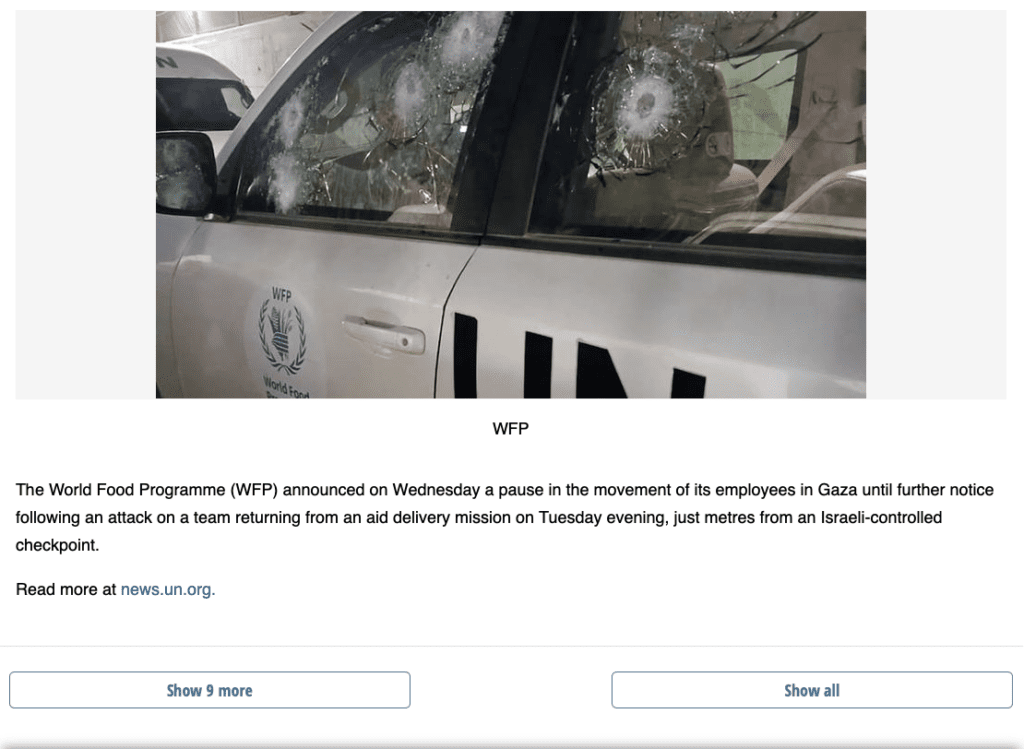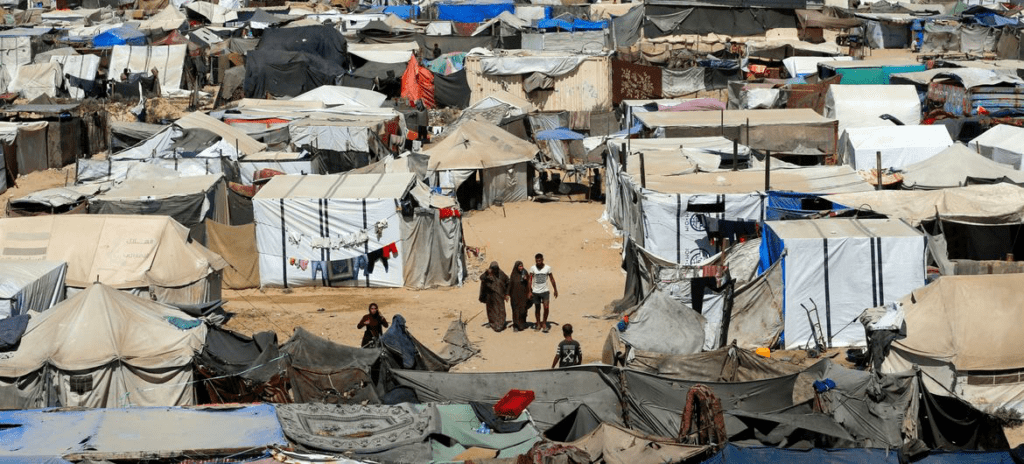
United Nations , 29 August 2024
The UN Security Council met in emergency session in New York on the continuing crisis in Gaza and the occupied West Bank on Thursday. Earlier, the World Health Organization (WHO) announced agreement had been reached with Israel to allow a mass polio vaccination campaign to get underway through a series of humanitarian pauses beginning on Sunday. UN News app users can follow coverage here.
Security Council briefed on latest humanitarian situation
The Security Council held an emergency meeting in New York to discuss the latest developments in the Middle East, at the request of the United Kingdom. The acting head of UN humanitarian wing OCHA, Joyce Msuya, told ambassadors humanitarians are working “relentlessly” to stop the spread of polio through the enclave, after the first case in 25 years was detected last week.
WHO’s Mike Ryan told the Council the polio campaign needed to “mark a significant change” to the whole process of aid delivery in Gaza, which must come at “much large scale, at a much faster pace and without any hindrance.”
The meeting comes on the heels of escalating settler violence in the West Bank alongside an attack against a World Food Programme (WFP) team in Gaza, which prompted the agency to halt its operations in the war-torn enclave until further notice.
Meanwhile, the UN agency for Palestine refugees (UNRWA) continues to coordinate with other UN agencies to deliver much-needed polio vaccines after the once-eradicated disease reappeared in Gaza.
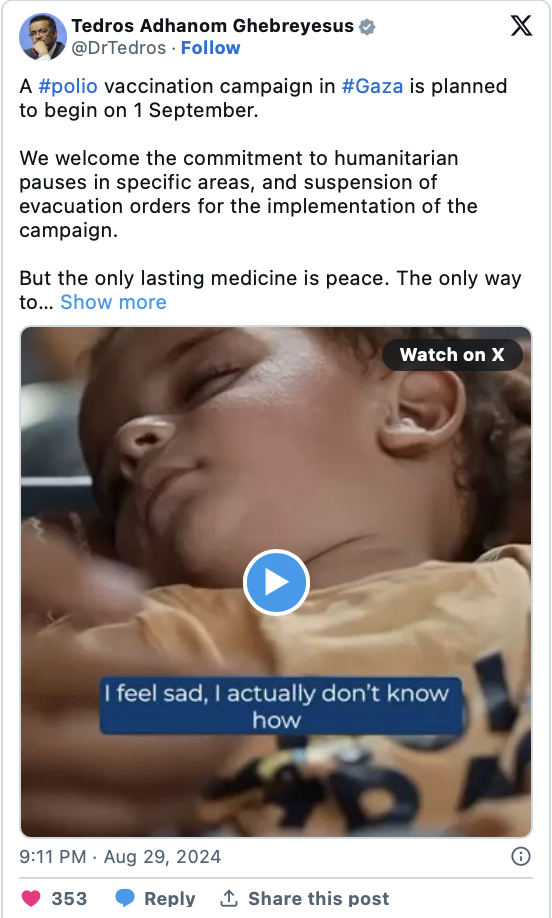
Algeria: Vaccination campaign must succeed

Nacim Gaouaoui, Algeria’s Ambassador and Deputy Permanent Representative, said that the briefings today reflected the “tragic reality” of the international community’s failure to enforce humanitarian law inside Gaza.
“They clearly show the scale of the brutality the Palestinians are subjected to as a result of an occupation that disregarded all conventions and norms,” he said, calling for an immediate and permanent ceasefire to bring the “catastrophic humanitarian situation” to an end.
The Israeli occupation should also be held accountable for its crimes and blatant violations of International Humanitarian Law, he added.
Mr. Gaouaoui also voiced deep concern over the obstruction of aid and the targeting of relief workers. Forced displacement and targeting of humanitarians – including killings – “are war crimes” for which perpetrators must be held accountable, he stressed.
“Humanitarian workers are not obligated to risk their lives to provide assistance to those in need. It is our obligation to protect them and enable them to carry out their noble functions without fear or threat,” he said.
The Algerian representative also emphasized the importance of UNRWA, the main UN agency assisting Palestine refugees, stating, that “it is the backbone of humanitarian work in Gaza and it cannot be replaced.”
UNRWA also has a critical role to play in ensuring inoculations reach children in need.
“The vaccination campaign must be successful, and we must provide the necessary conditions for its success,” he added.
West Bank: UN chief calls for immediate end to Israeli strikes

As the crisis in the West Bank continues to escalate alongside the ongoing war in Gaza, UN Secretary-General António Guterres has called for an “immediate cessation” of Israeli military operations in the occupied Palestinian territory.
Read more at news.un.org.
Russia: Council must use available tools to end the war

Dmitry Polyanskiy, Deputy Permanent Representative of Russia, he said the Security Council must ensure that the UN and its agencies can continue their work in Gaza.
“All of these words uttered today have transformed into futile cliches,” he said, recalling the devastation of Gaza and suffering of its people as well as the recent incident involving Israeli forces that fired on a UN vehicle.
Nearly the entire population needs assistance, he said.
At the same time, but UN agencies are warning that “there is no safe space in Gaza” amid the outbreak of such infectious diseases as polio.
An open-ended sustainable ceasefire is needed, he said, adding that the international community must demand that Israel end attacks against humanitarian workers.
However, to achieve a ceasefire in Gaza, the Security Council must take action using existing tools that are at its disposal. What is missing, he said, is the political will to do so.
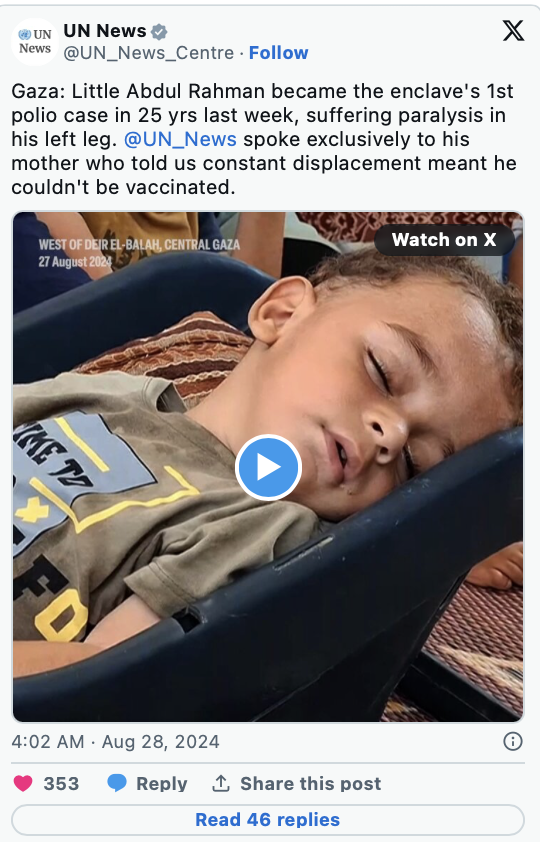
France: Situation is ‘untenable’

The current humanitarian situation is “untenable” as evacuation orders increase, ramping up danger for civilians and constraining aid workers’ effectiveness on the ground, remarked the French Permanent Representative Nicolas de Rivière.
He urged Israel to implement an “effective deconfliction system, through humanitarian pauses” and to ensure the “non-negotiable” start of the polio vaccination campaign.
He further called on Israel to take “all necessary measures in the face of the unacceptable settler attacks against the Palestinian civilian population in the West Bank”, noting they were being carried out in violation of international law.
He condemned “all acts of provocation” in Jerusalem as well as in the West Bank, voicing his country’s opposition to “any Israeli occupation of the Gaza Strip”.
The Ambassador reaffirmed French support for US, Egyptian and Qatari mediation efforts and called on all parties to “make the necessary compromises to allow a ceasefire to be put in place”.
Settler violence escalates in the West Bank
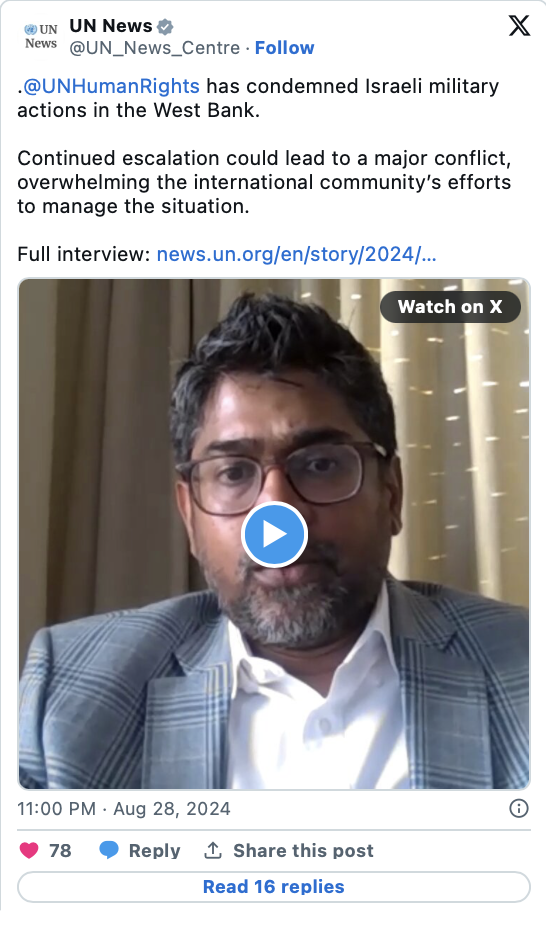
Guyana: Developments in the West Bank not to be ignored

Trishala Persaud, Deputy Permanent Representative of Guyana to the UN, described the humanitarian situation in Gaza as “increasingly catastrophic with each passing day”.
She urged members of the Security Council to work together to ensure the hostilities in Gaza come to an end.
“History will judge us harshly if this Council does not act to save the Palestinian people from the scourge of this unending onslaught in flagrant violation of the [UN] Charter and international law,” she said.
She further noted that constant evacuation orders to Palestinians by the Israeli authorities were hampering the delivery of humanitarian aid.
Speaking on the current polio situation, Ms. Persaud said that “delaying a humanitarian pause will only increase the risk of it spreading.”
UN agency halts staff movements after team attacked
